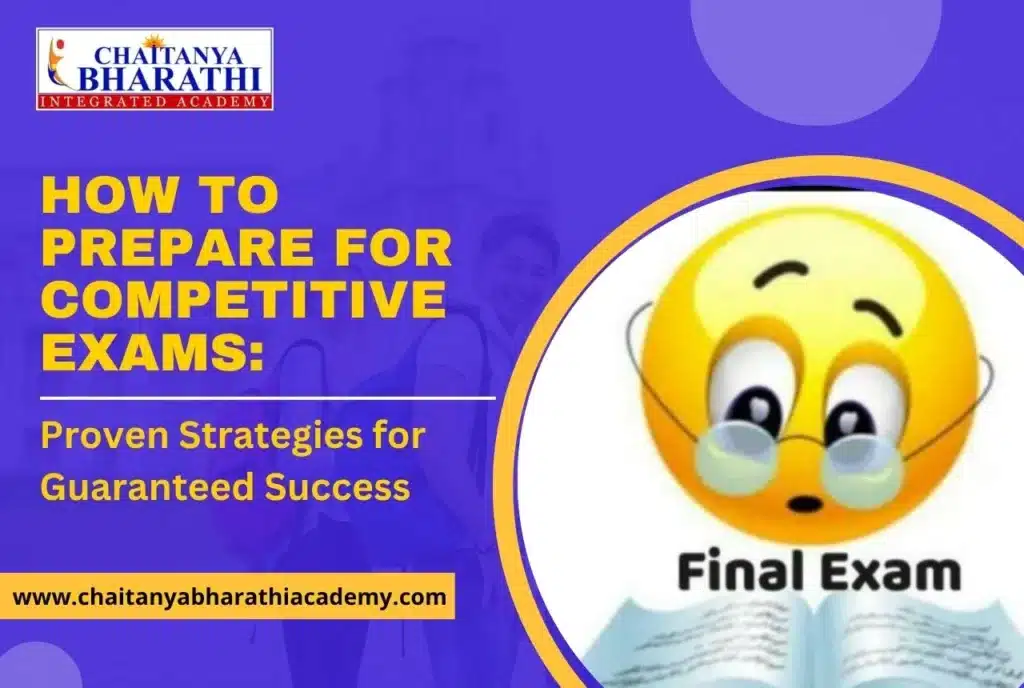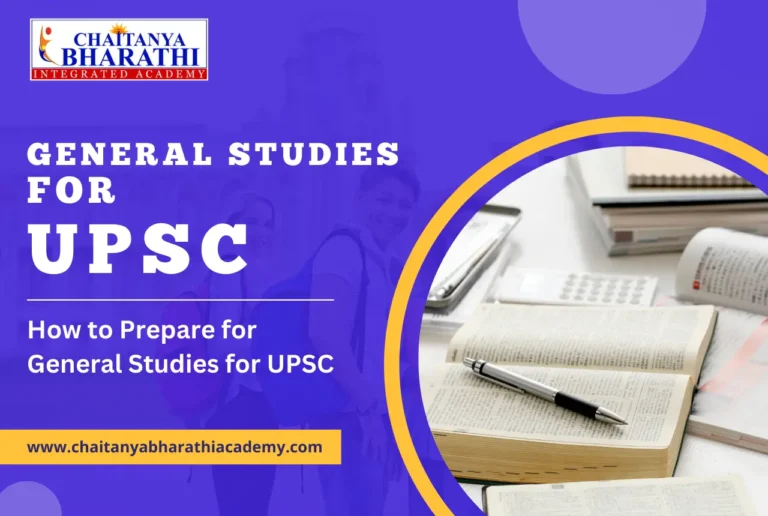Learn how to prepare for competitive exams with expert-backed strategies from Chaitanya Bharathi. Discover study plans, revision methods, practice techniques, and exams tips to crack your exam in the first attempt.
Cracking a competitive exam on the very first attempt is not a miracle—it is the result of consistent effort, the right direction, and highly structured study methods. Every year, thousands of students succeed because they follow proven strategies that strengthen conceptual clarity, sharpen problem-solving skills, and build long-term confidence.
At Chaitanya Bharathi, we mentor aspirants to develop smart learning habits and prepare systematically for India’s toughest competitive exams. This comprehensive guide explains how to prepare for competitive exams efficiently, avoid common mistakes, and approach your first attempt like a topper.
Why First-Attempt Success Is Achievable for Every Student
The common myth is that only exceptionally intelligent students crack exams in the first attempt. Reality is different. Success comes from:
- A clear study plan
- Consistent revision
- Proper time management
- Quality practice
- Positive mindset
Top students simply master the art of exam discipline. With the right mentorship, you can follow the same path and achieve outstanding results.
1. Start with a Clear Understanding of the Exam Structure
A thorough understanding of the exam pattern lays the foundation of your journey. Before beginning your exam preparation, analyze:
- Syllabus structure
- Chapter weightage
- Difficulty levels
- Marking scheme
- Previous years’ papers
- Question format
This clarity helps you prioritize topics, avoid confusion, and plan your time more effectively.
2. Build a Practical and Balanced Study Plan
Your success depends heavily on how well you organize your study schedule. A powerful and well-balanced timetable ensures steady learning without burnout.
How to create a topper-style study plan:
- Divide your day into subject-wise slots
- Allocate more time to tough or high-scoring topics
- Keep daily revision slots
- Set weekly learning targets
- Track your progress through checklists
- Keep buffer days for incomplete topics
A structured timetable eliminates stress and helps you study smarter, not harder.
3. Strengthen Your Basics—The Secret Behind Toppers’ Accuracy
Most competitive exams test your fundamentals. Students who work on basic concepts perform significantly better because advanced questions often build on foundational knowledge.
How to strengthen your basics:
- Start with standard textbooks
- Understand concepts through real-life examples
- Watch conceptual videos for clarity
- Create simple notes in your own words
- Practice beginner-level questions before moving to advanced ones
Chaitanya Bharathi focuses heavily on concept-building to help students become fast, accurate, and confident.
4. Use High-Quality Learning Resources Only
One of the biggest mistakes students make is using too many books. This creates confusion and slows down progress.
Use:
- Standard reference books
- Verified online materials
- Subject-wise question banks
- Institute study notes
- Topic-wise practice worksheets
Using selective, high-quality material improves retention and reduces the load.
5. Practice Mock Tests and Previous Papers Regularly
Mock tests are the backbone of effective exam success. They help you understand real exam situations, manage time, and develop confidence.
Benefits of regular mock test practice:
- Improves accuracy
- Helps identify weak topics
- Boosts problem-solving speed
- Reduces exam anxiety
- Helps simulate real testing conditions
The more mock tests you solve, the stronger your exam grip becomes.
6. Learn Time Management and Smart Solving Techniques
Time is the biggest challenge in competitive exams. Even well-prepared students struggle when they cannot manage time effectively.
Smart time management strategies:
- Start with the easiest questions to build momentum
- Do not spend too long on a single question
- Use shortcut formulas and quick techniques
- Learn the elimination method for objective exams
- Maintain a steady exam pace
With proper training, you can solve more questions correctly within the time limit.
7. Prepare Effective Notes for Quick Revision
Smart note-making is essential for long-term memory. Good notes save time, simplify revision, and help you recall entire topics quickly during the final days.
Your notes must include:
- Key formulas
- Concept summaries
- Shortcuts
- Diagrams and flowcharts
- Important definitions
These notes will become your most valuable asset during the final phase.
8. Study From Home With Discipline and Focus
With access to digital education, many students prefer self-study at home. Knowing how to prepare for competitive exams at home helps you learn independently with full flexibility.
Effective home-study tips:
- Create a distraction-free study corner
- Maintain a strict daily routine
- Use online lessons and mock tests
- Reduce noise and mobile interruptions
- Take short breaks to refresh your mind
Studying at home saves long travel hours and helps improve overall productivity.
9. Revise Regularly to Strengthen Long-Term Retention
Revision is the bridge between preparation and success. Without consistent revision, information fades quickly.
How to revise like a topper:
- Revise each topic at least 5–6 times
- Use flashcards for formulas
- Revise mock test mistakes
- Create chapter-wise mind maps
- Revise weekly and monthly
Consistent revision keeps your memory fresh and boosts exam confidence.
10. Stay Healthy, Motivated, and Mentally Balanced
Your physical and mental health directly affects your performance. A calm and energized mind absorbs concepts faster and solves questions more effectively.
Maintain good health by:
- Sleeping 7–8 hours daily
- Eating nutritious meals
- Staying hydrated
- Walking or exercising 20 minutes a day
- Meditating or practicing breathing exercises
Avoid late-night study stress, as it reduces concentration the next day.
11. Track Your Growth and Improve Continuously
Evaluate your performance weekly. This helps you understand your strengths and weaknesses.
Track your preparation using:
- Weekly test scores
- Mistake analysis sheets
- Concept revision lists
- Speed and accuracy charts
Improvement becomes easier when you know where to focus.
Conclusion: Your First Attempt Can Be Your Winning Attempt
The journey of how to prepare for competitive exams becomes simpler when you follow a structured plan, practice consistently, stay dedicated, and maintain a positive mindset. With the right approach and right support, clearing your exam in the first attempt becomes not just possible—but highly achievable.
Chaitanya Bharathi continues to empower students through expert faculty, advanced learning resources, systematic coaching, and personalized mentoring—ensuring that every student is fully prepared to succeed in their very first attempt.











